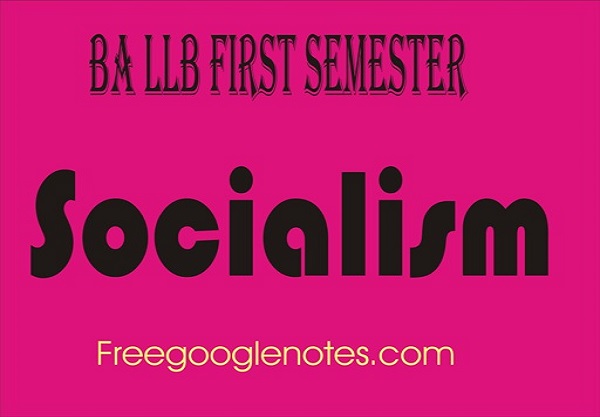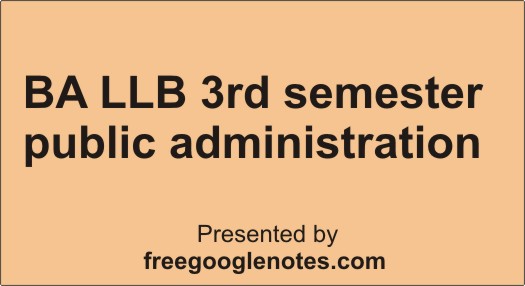Table of Contents
SOCIALISM(BA LLB notes)
Q. 1. Explain briefly the basic principles of Socialism. Define, Socialism. Discuss the Socialistic Theory.
Ans. Socialism is the theory which holds that individual freedom and social welfare can be best secured under state regulation than by
restricted private enterprise. In other words, it is a portest against tne theory of individualism and is the off shoot of the failure of the laissez faire policy to promote the interest off all manufactures, growers, workers and consumers. Socialism is a doctrine largely of economic importance but it has also wide political implications. The writers have tried to define socialism but it is difficult to give an exact definition. Once Rapport said “If I am asked whether I am a socialist myself. I can not but frankly reply do not know. It all depends upon what one understands by socialism.”
Definitions
(1) According to Encyclopaedia Britannica, “Socialism is that policy or theory which aims at securing by the action of central democratic authority a better distribution and in subordination thereto, a better production of wealth than now prevails.”
(ii) According to Sellers, “Socialism is a democratic movement whose purpose is the securing of an economic organisation of society which will give the maximum possible at any one time of justice and liberty.”
(ii) According to Bernard Shaw, “Socialism means equality of income and nothing else.”
(iv) According to G. D. H. Cole, “Socialism means for closely connected things – a human fellowship which denies and expels distinction of claşs, a social system in which no one is so much richer or poorer than his neighbours as to be unable to mix with them on equal terms, the common ownership and use of all the vital instruments of productions, and an obligation upon all citizens to serve one another
according to their capacities.”
(v)- According to Ramsay-Maldonald, “No better definition of socialism can be given in general terms than that it -aims at the organisation of the meterial economic forces of society and their control by the human forces.”
(vi) Socialism is “The political movement of the working classes which arms to abolish exploitation by means of the collective ownership and democratic management of the basic instruments of production and distribution.” Philosophy of Socialism
Socialism is a powerful protest against the existing capitalism, Capitalism has brought about unequal distribution of wealth. Under it the rich grows richer and the poor becomes poorer. It gives the political power to the capitalist who control the state machinery to their advantage. The workers turn into slaves selling their labour for inadequate wages. The capitalists appropriate for themselves Share of profits which leads to heart burning among the workers.
Socialism seeks to replace the existing capitalistic system by elimination
of private enterprise and abolition of private property. Capitalism has brought in its wake many, economic, political and social evils. Socialism seeks to do away with these evils by organising a better system of production and distribution of wealth through state planning and state control. This aim of socialism is man’s emancipation his restoration to the unalienated, unrippled individual who enters into a new, rich, spontaneous relationship with his fellowmen and with nature.
The following main feature of socialism may be summarised —
(1) Socialism will eliminate capitalism. Capitalism is based on the principle of prosit making whereunder the object is to have more profit. It has led to unequal distribution of property, has created a wide gulf between the ‘haves’ and have nots. Socialism seeks to curb capitalism by abolishing it. Referring to the various effects of capitalism on the individual Forman remarked. “The individual because more alone isolated, became an instrument in the hand of overwhelmingly strong forces outside himself became an individual but a belidered and insecure individual.
Socialism would abolish the institution of private property. The socialists believe that land and accumulated wealth should belong to all, not to a privileged few. Weak should be protected against the exploitation by the rich.
(3) Socialism will eliminate anti-social forms of competition. Under the present system competition is unfair which leads to extravagance and wastefulness. Socialista will substitute co-operation for competition.
(4) Socialism would secure economic quality for all abolishing the wide gaps between the different sections of the society. According to Leavelcye. “Every socialists doctrine aims at introducing greater equality into social conditions. Socialism is an equaliser and leveller.”
(5) Socialism lays more emphasis on society than the individual. Under socialism only those things will be produced which are needed by the society. Social welfare will be the main criterion of production in socialists state.
Evaluation – The above are the main tenets of socialism. Clearly, it seeks to eradicate unhealthy forms of competition and eliminates the capitalist. It seeks to reduce the present economic inequalities and
Create a better type of society, Altruism rather that selfishness would dominate
man’s actions under socialism. A socialist regime, they believe,
would create a more desirable type of character and a better standard of values.
However, the critics hold that socialism means authoritarianism and bureaucracy on a wide scale. There is every likelihood of an increase in corruption, intrigue and personal spite. Nepotism, redtapism and favouritism may grow up. In the words of Crossman “Actually the growth of a vast centralized stále bureaucracy constitutes a grave potential threat to social democracy”. The system, the critics argue is despotic instead of being democratic. Moreover, the state may not efficiently manage the enterprise. The paid employers being disinterested may not feel so zealous in their work as the private entrepreneur.
Under stale control the critics hold, production would diminish and may be, all reduced to a level of poverty. Besides, the difficulties of administration and other difficulties of a practical nature, socialism runs counter to human nature.
However, even if socialism is faced with some difficulties, the movement is, nevertheless, necessary for every society. Socialism, none may deny, has brought about numerous reforms in social legislation Rise in wages, improvement in the factory conditions, reduction of hours of work fixation ol prices, ceilling of property, all are direct or indirect results of socialism. AIT slates today perform functions which are socialistic in nature. Moreover, socialism shows that political democracy is useless with economic or social democracy. In a country where there are many unjust previleges and economic inequalities and when the country has to undergo rapid industrialization and modernization socialism is the only panacea of social and economic maladies.
Emergence of Socialism
The close of the nineteenth century witnessed the doom of individualism. Dicey was quick to discover the collectivist trend in legislation in about 1870 in England. The present century opened its innings with little promise for traditional individualism. With passage of time, individualism began to steadily lose its territory to the emerging doctrine of socialism. In the twenties and thirties, socialism made an *open revolt in politics. Under the challenge of socialist ideas, individualism, with its principle of non-intervention, staged a retreat in most of the countries of the west. Traditional individualism was found to be a clog on the wheel of progress, and came to be increasingly rejected by the people cither through the verdict of the ballot-box or
through the challenge of open rebellion. Socialism in some from or other seized the temple of politics.
The philosophers of laissez-faire equated industrial capitalism with an unending era of prosperity. The nineteenth century world for the most part was full of optimism. But soon it was found that the complex economic problem created by industrial capitalism could not be effectively tackled by traditional individualism. It was an inadequate response to the challenge of new problems. Adam Smith’s favourite child-free competition-passed away before it could grow lo full maturity. The growth of monopoly in the economy called for increasing state intervention. With its grip over the key and strategic points in the economy, monopoly was found to be a menace to both the consumers and small producers. The abundant control over the supply enabled the monopolists to inflate the prices of the consumer’s goods and swell their coffer of prosit at the expense of the consumer’s interests. The small producers could rot complete with the vast resources of the monopolists, and consequently failed to stand the test of competition, To curb the powers of the monopolists, the governments in different countries passed anti-monopoly legislations.
Q. 2. Define socialism and explain the main ideas underlying it.
Ans. Opposed to the theory individualism there stands a doctrine which believes in the state control of the means of production and methods of distribution. This is called socialism. This advocates of socialism seek to expand the activities of the government and place under its control not only the economic enterprises of individuals, but also the activities of a multitude of economic groups, corporations, trae unions and cooperative societies.
Socialism is a doctrine largely of economic import but as politics is also economics, it has also got political implication. As a theory of economic reorganization socialism is quite old, but as a political doctrine it is quite recent – the product of the industrial era. In the carly 19th century a number of thinkers including Robert Owen, W. Thompson, De Sainti Simon, C. Fourier, E. Cabet, L. Blare put forward numerous proposals for social and economic reconstruction with political implications. But their socialism was utopian in character. Their proposals were visionary. Owen wanted to replace the present competitive system by a cooperative one where justice and harmony will prevail, Saint Simon sought to remove the old feudal and clergy
classes and denied to have an industrial state. He wanted to substitute feudal aristocracy by a working autocracy of merit. Charles Fourier wanted the society to be organised into independent groups, each group consisting of 1620 persons named as Phalnax. Each was lo do work he liked best. There was to be no government at all. But the state was to be dissolved only when the Phalnas had generally superseded previous social units. Cabet condemned the evils of the existing social system and wanted to have a society where everything except the family was nationalised and regulated by a kind and generous agreement.
But the socialism preached by the above thinkers was of a visionary and utopian type. They could not mark out any distinction between anarchism, communism and socialism. As a matter of fact, the society which they wanted to establish was of a communistic character.
Besides the utopian socialists there were a some thinkers who took up the name of Christian socialists. Among them the most notable arc Dc Lamennais in France ; Kingsley and Maurice in England. The object of De Lamcnnais was to bring about an alliance between the church and tho masses in opposition to kings whom he regarded as oppressors of the people. The church was to play a double role. It was to become the soul of the religious world and the economic world. He was in favour of the establishment of cooperative associations of labours by the Church. He attributed the difficulties of the people to the rulers and the capitalists. As regards the Christian socialists of England, Maurice followed the Owenite school in his economic philosophy. However, be condemend the idea of the soverignty of the people as athestic and subversive. Kingsley was an ardent and aggresive type of socialist. Both Kingsley and Maurice repudiated the notion that Christianity has no direct concern with political and economic questions er with the problem of setting up just and healthy modes of social life. According to Maurice, “We are teaching true socialism, true liberty, brotherhood and equality, not the carnal dead level equality of the communist, but the spiritually equal of the church idea, which gives every man an equal chance of developing and rewards every man according to his work.”
Though the Christian socialists were quite influential in promoting a general movement for cooperative among working men and also in securing the enactment of laws to facilitate the organization of the cooperative societies, yet they has no comprehensive ideas no political
questions. They succeeded in rising the prestige of the Church and bringing the masses within their membership ; but the associations established and journals started by them to propagate christian socialism soon failed.
Socialism was given a scientific and popular basis by Karl Marx and Engels in 1848 through the publication of Communist Manifesto’. Karl Marx made socialism scientific and militant and gave it a distinctly political turn Since his times varied schools of socialism have developed in different countries. Socialism has assumed different forms and came to be known by various names such as Fabianism, Guild Socialism, Collectivism and Marxian socialism. The term “Socialism has come to be so much misunderstood and so loosely employed’ that Joad was led to remark that “socialism is like a hat that has lost its shape because everybody wears it.”
To give an exact definition of Socialism is a difficult task. Referring to the difficulty of defining socialism Ropport said, “If I am asked whether, I am a socialist myself. I cannot but frankly reply ; I do not know. It all depends upon what one understands by socialism. According to Dr. Schadwell, “Socialism is the most complicated many sided and confused question that ever plagued the minds of men.” According to Ramsay Muir, “Socialism is a charnelon like creed.” It changes its colour according to its environment. For the street corner and the club room, it wears the flaming scarlet to loss war; for the intellectuals it is red shot with tawney ; for the sentimentalists, it becomes a delicate rose pink, and in clerical circles or assumes a virgin-white just touched with a faint flush of generous aspiration”. Some of the definitions of socialism are as follows: Various definitions of Socialism
(i) “Socialism is that policy or theory which aims at securing by the action of central democratic authority a better distribution and in subordination thereto, a better production of wealth than now prevails.” (Encyclopaedia Britannica)
(ii) “Socialism is the political movement of working classes which aims to abolish exploitation by means of the collective ownership and democratic management of the basic instrument of production and distribution.” (Hughan)
(iii) Socialism is “a democratic movement those purpose is the securing of an economic organisation of society which will give the maximum possible at any one time of justice and liberty.” (Sellars)
(iv) Socialism is “the common holding of the means of pro and exchange, and the holding of them for equal benefit of al!”(Hubert Bland)
(v) “Socialism means equality of income and nothing (Bemard Shaw)
(vi) “No better definition of socialism can be given is ge terms than that it aims at the organisation of the material econn. forces of society and their control by the human forces.” (Ramsay MacDonald)
(vii) “Let us repeat once again that the Alpha and Omega socialism is the transformation of private and competing capitals into a united collective capital.” (Schaffle)
(viii) “A socialist is one who looks to society organised in the state for aid in bringing about a more perfect distribution of economic goods and an elevation of humanity ; the individualist regards each man, not as his brother’s keeper, but as his own, and desires every man to work out his own salvation, material and original.”
(xi) “Socialism means four things – a human followship which denies and expels distinction of class, a social system in which no one is so much richer or poorer than his neighbours as to be made unable to mix with them in equal terms, the common ownership and use of all the vital instruments of production, and an objective upon all citizens to serve one another according to their capacities.” (G.D.H.).
(x) “The programme of socialism consists essentially to the demand, viz., that the land other instruments of production shall be the common property to the people and shall be used and governed by the people for the people.” (Robert)
Thus, the scholars have defined socialism in their own way. However, one thing is common to above definitions. They lay emphasis on the welfarç of the people. Socialism seeks to give equality to me people. It would try to remove exploitation of one class both other and ensure economic and political equality to all. We may summarise the essentials of socialism as follows :
(i) Socialism lay more emphasis on society than on individual According to Fred Bramley, “Socialism implies the sub- ordination the interests of the individual to the interests of society.” Under social only those things will be produced which are needed by the Social good and not the profit motive will be the criterion of production in a socialist state.
(ii) Socialism will eliminate capitalism. The socialists regard capitalists the enemies of society. Capitalism is based on the principle of the prosit making. The object is not to have more production but to have more profits. Capitalism has led to unequal distribution of wealth. A wide guld has been created between the haves and have-nots. There is much wastefulness and injustice in the existing capitalistic system. Production is carried without any regard to the needs of the community. Socialism seeks to remedy capitalism by abolishing it.
(ii) Socialism will eliminate anti-social forms of competition, Under the present system competition is unfair which leads to extravagance and wastefulness. Moreover, there is no fair competition between the rich and the poor on account of great disparity of income. The wage-earners also stand in a disadvantageous position under the present system. Capitalism has led to unemployment. Socialism would prevent the unnecessary, competition and substitute co-operation for competition.
(iv) Socialism would secure economic equality to all. The capitalist system has produced wide economic gaps in society. Economic inequality is the characteristics feature of the capitalistic society. According to Laveleye, “Every socialistic doctrine aims at introducing greater equality into social conditions. Socialism is an equaliser and leveller.” The ideal of economic equality may be recognised as the fundamental ethical tenet of modern socialism. According to Woolsey, the equalitarian principle “is not only the fundamental conception of socialism but also that which gives its main grip upon the Proletarian mind.”
(v) Socialism stands for public control of the means of production. It would abolish private enterprise. In other words all the factors of production would be nationalised. Socialism regards land and other instruments of production as common property which should be used and governed by the people for the people. Blotchford writes, “Make the land and all instruments of production national property ; put all farms, mines, ships and railways under national control and practical socialism is accomplished.”
(vi) Socialism would abolish the institution the private property which had led to the inequalities of wealth and opportunity. The socialists believe that land and accumulated capital should belong to all, not to a privileged few. Income should be equalised by protecting the weak against exploitation.
Appraisal of Socialism
Socialism, as is clear, seeks to eradicate unhealthy forms of competition and eliminate the capitalists. It seeks to reduce present economic inequalities and create a better type of society. Capitalism. it is said, lowers individual character, encourages dishonesty and unfairness. A socialist regime, it is believed, would create a more desirable type of character and a better standard of values. Altruism rather than selfishness would dominate man’s actions under socialism. The socialists seek to extend democracy in the economic fields and thereby make democracy real.
While socialism is an attractive doctrine, critics say that socialism means authoritarianism and bureaucratic control on a wide scale. The number of officials will increase manifold. There is every likelihood of an increase in corruption, intrigue and personal spite. Nepotism, red-tapism and favouritism, the evil of public enterprise, may grow up. In opposition to the socialist claim that their system is democrastic the critics argue that it is despotic and authoritarian. A government exercising such wide powers as socialism demands, is bound to become bureaucratic and irresponsible. Moreover, the state may not efficiently manage the enterprises. The paid employees of the state are not so interested and zealous in their work is the private entrepreneur is used to be. The sense of duty is not so highly developed among public servants that they will work whole-heartedly. Under state control, government managers lack interest, production would diminish and may be, all may be reduced to a level of poverty. Practical experience has proved that its action is slow and mechanical. With the absence of the hope of reward individual initiative would be checked and improvements would be retarded. Besides the difficulties of administration and other difficulties of a practical nature, socialism runs counter to human nature as it is. If mankind is perfected to the point socialism demands, it will make little difference what form of organization is adopted.
However, even if socialism is faced with some difficulties, the
movement is necessary for every society and every political group. Socialism has brought about numerous reforms in social legislation. Rise of wages, reduction of hours of work, improvement of factory conditions, fixation of prices, ceiling of property are the direct of indirect results of socialism. All states today perform functions which are socialistic in character. Moreover, socialism shows that political
democracy is meaningless unless coupled with economic or social democracy.









